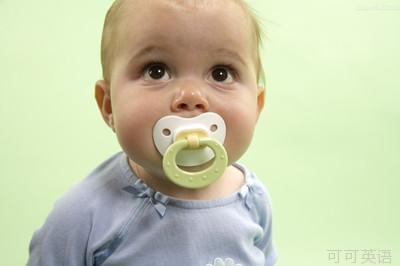(单词翻译:单击)
The first hours of life can be rough. So for years newborns in the hospital were given pacifiers to calm and quiet them—with many breast-feeding advocates worrying the newborns would get used to the artificial nipple and be less inclined to take to the breast.
生命之初的几个小时可谓是艰辛的。因此多年来,给医院里的新生儿喂奶嘴被当作使他们平静安宁下来的好法子。许多母乳喂养倡导者们担心新生儿们会因习惯于人造的乳头而变得不太愿意吃奶。

But never fear. A study finds that keeping kids from getting pacifiers did not help later breast-feeding. In fact, it looks like this hindered the kids eventually becoming exclusively breast-fed.
然而不必担心。一项研究发现让婴儿们远离奶嘴并不有助于后期的母乳喂养。实际上,这似乎会阻止孩子们完全靠母乳喂养长大。
The study followed more than 2,000 infants born over the course of about a year. When pacifiers were prohibited, surprisingly, fewer babies were breast-fed exclusively while in the hospital and more received supplemental formula. The findings were presented at the Pediatric Academic Societies annual meeting.
这项研究调查了两千多名婴儿,在他们出生后一年的时间内持续进行跟踪。令人惊讶的是,在医院时禁止使用奶嘴的孩子中,很少有是完全由母乳喂养的,更多的孩子都会辅以奶粉喂养。这项研究在儿科学会年度会议上发布。
The World Health Organization recommends breast-feeding babies exclusively for six months and then partially until age two. So for those early hours, a pacifier might be just what the doctor—or maternity ward nurse—ordered.
世界卫生组织建议婴儿出生后的六个月内完全靠母乳喂养,六个月后至两岁前部分靠母乳喂养。那么在最初的时光里,喂婴儿奶嘴可能只是医生或者产科病房护士的命令。
原文译文属可可原创,未经允许请勿转载!


